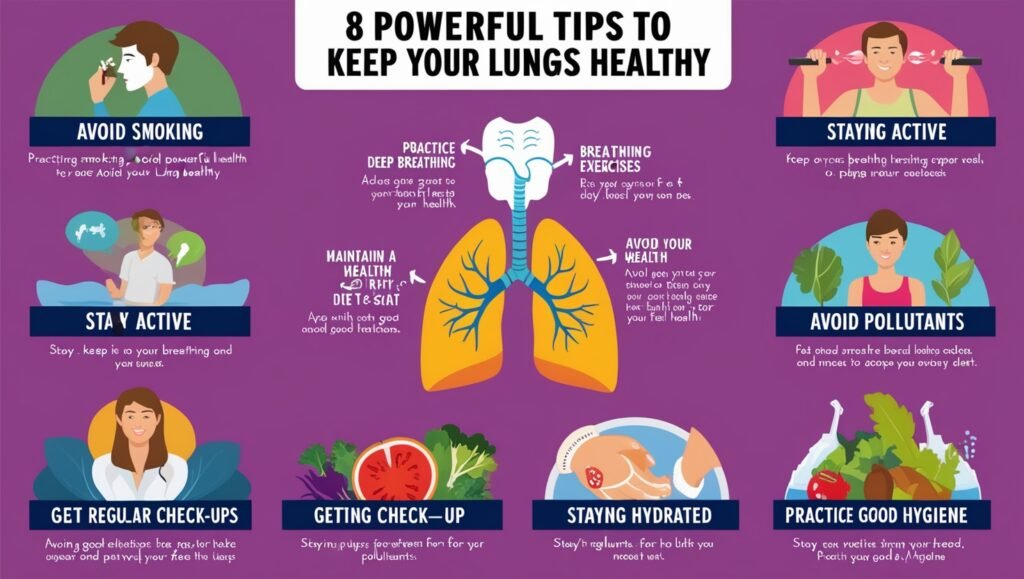
8 Powerful Tips to Keep Your Lungs Healthy
8 Powerful Tips to Keep Your Lungs Healthy
“Powerful tips to keep your lungs healthy and strong. Discover 8 effective strategies to improve lung health and enhance overall well-being.”


Introduction
Importance of Lung Health for Overall Well-Being
Lung health is crucial for overall well-being as it ensures efficient oxygen exchange, which is vital for the functioning of every cell in the body. Healthy lungs support physical activity, enhance energy levels, and improve the quality of life. Poor lung health can lead to respiratory issues, reduced stamina, and increased susceptibility to infections and chronic diseases.
Overview of the 8 Powerful Tips to Keep Your Lungs Healthy
In this article, we will explore eight powerful tips to help you maintain healthy lungs and enhance your overall well-being. These tips are designed to be practical and effective, ensuring that you can easily incorporate them into your daily routine. By following these tips, you can improve lung function, prevent respiratory issues, and enjoy a healthier life.
Brief Introduction to the Structure of the Article
The article is structured to provide a comprehensive approach to lung health. Each tip focuses on a specific aspect of lung care, ensuring a well-rounded and effective routine. Here’s a brief overview of what to expect:
- Tip 1: Avoid Smoking and Secondhand Smoke
- Tip 2: Practice Deep Breathing Exercises
- Tip 3: Stay Active with Regular Exercise
- Tip 4: Maintain a Healthy Diet
- Tipp 5: Avoid Exposure to Pollutants
- Tip 6: Get Regular Check-Ups
- Tip 7: Stay Hydrated
- Tip 8: Practice Good Hygiene
By following these tips, you can take proactive steps to keep your lungs healthy and strong.

Tip 1: Avoid Smoking and Secondhand Smoke
Explanation of the Harmful Effects of Smoking on Lung Health
Smoking is one of the leading causes of lung damage and respiratory diseases. The harmful chemicals in tobacco smoke, such as tar and nicotine, can cause inflammation, reduce lung function, and increase the risk of chronic obstructive pulmonary disease (COPD), lung cancer, and other respiratory conditions. Smoking also weakens the immune system, making it harder for the body to fight off infections.
Importance of Avoiding Secondhand Smoke
Secondhand smoke, also known as passive smoke, is the smoke exhaled by a smoker or emitted from the burning end of a cigarette. It contains many of the same harmful chemicals as direct smoking and can have serious health effects on non-smokers, including respiratory infections, asthma, and an increased risk of lung cancer. Avoiding secondhand smoke is essential for protecting your lung health and the health of those around you.
Tips for Quitting Smoking and Creating a Smoke-Free Environment
- Seek Support: Reach out to healthcare professionals, support groups, or smoking cessation programs for guidance and encouragement.
- Use Smoking Cessation Aids: Consider using nicotine replacement therapy (NRT) products, such as patches, gum, or lozenges, to help manage withdrawal symptoms.
- Identify Triggers: Recognize situations or activities that trigger the urge to smoke and develop strategies to avoid or cope with them.
- Create a Smoke-Free Home: Establish a smoke-free policy in your home and car to protect yourself and your loved ones from secondhand smoke.
- Stay Active: Engage in physical activities and hobbies to distract yourself from cravings and reduce stress.
- Celebrate Milestones: Reward yourself for reaching milestones in your journey to quit smoking, and stay motivated by tracking your progress.
Tip 2: Practice Deep Breathing Exercises
Benefits of Deep Breathing Exercises for Lung Function
Deep breathing exercises are beneficial for improving lung function and overall respiratory health. These exercises help increase lung capacity, enhance oxygen exchange, and strengthen the respiratory muscles. Regular practice of deep breathing can also reduce stress, improve relaxation, and promote better overall well-being.
Step-by-Step Guide to Performing Deep Breathing Exercises
- Find a Comfortable Position: Sit or lie down in a comfortable position with your back straight and shoulders relaxed.
- Inhale Deeply: Place one hand on your chest and the other on your abdomen. Take a slow, deep breath in through your nose, allowing your abdomen to rise as your lungs fill with air.
- Hold Your Breath: Hold your breath for a few seconds, allowing the air to fully expand your lungs.
- Exhale Slowly: Exhale slowly through your mouth, allowing your abdomen to fall as you release the air from your lungs.
- Repeat: Repeat this process for 5-10 minutes, focusing on deep, controlled breaths.
Recommended Breathing Techniques
- Diaphragmatic Breathing: Also known as belly breathing, this technique involves breathing deeply into the diaphragm rather than shallowly into the chest. It helps strengthen the diaphragm and improve lung efficiency.
- Pursed-Lip Breathing: This technique involves inhaling slowly through the nose and exhaling through pursed lips, as if blowing out a candle. It helps keep the airways open longer, improving oxygen exchange and reducing shortness of breath.
- Box breathing: Also known as square breathing, this technique involves inhaling for a count of four, holding the breath for a count of four, exhaling for a count of four, and holding the breath again for a count of four. It helps regulate breathing patterns and reduce stress.
Tip 3: Stay Active with Regular Exercise
Importance of Physical Activity for Lung Health
Regular physical activity is essential for maintaining healthy lungs. Exercise helps improve lung capacity, enhances oxygen exchange, and strengthens the respiratory muscles. Engaging in physical activity also promotes overall cardiovascular health, which is closely linked to lung function. By staying active, you can reduce the risk of respiratory conditions, improve stamina, and enhance your overall quality of life.
Benefits of Aerobic Exercises for Improving Lung Capacity
- Increases Lung Capacity: Aerobic exercises, such as running, swimming, and cycling, help increase the amount of air your lungs can hold, improving lung capacity.
- Enhances Oxygen Exchange: Regular aerobic activity improves the efficiency of oxygen exchange in the lungs, ensuring that your body receives adequate oxygen during physical exertion.
- Strengthens Respiratory Muscles: Exercise strengthens the muscles involved in breathing, such as the diaphragm and intercostal muscles, making it easier to breathe deeply and efficiently.
- Reduces Breathlessness: Improved lung function and increased lung capacity can help reduce feelings of breathlessness during daily activities and exercise.
Recommended Exercises and Tips for Staying Active
- Walking: Walking is a low-impact exercise that can be easily incorporated into your daily routine. Aim for at least 30 minutes of brisk walking most days of the week.
- Swimming: Swimming is an excellent full-body workout that enhances lung capacity and strengthens respiratory muscles. It is also gentle on the joints, making it suitable for people of all fitness levels.
- Cycling: Cycling, whether on a stationary bike or outdoors, is a great way to improve cardiovascular and lung health. Aim for regular cycling sessions to boost lung capacity.
- Dancing: Dancing is a fun and enjoyable way to stay active and improve lung function. Join a dance class or dance at home to your favorite music.
- Tips for Staying Active:
- Set realistic goals: Set achievable fitness goals and track your progress to stay motivated.
- Find Activities You Enjoy: Choose exercises that you enjoy to make staying active more enjoyable and sustainable.
- Mix It Up: Vary your workouts to keep things interesting and prevent boredom.
- Stay Consistent: Aim for at least 150 minutes of moderate-intensity aerobic activity each week.
- Listen to Your Body: Pay attention to how your body feels during and after exercise. Rest when needed and avoid overexertion.
Tip 4: Maintain a Healthy Diet
Role of Nutrition in Supporting Lung Health
Nutrition plays a vital role in maintaining healthy lungs. A balanced diet provides the essential nutrients needed for optimal lung function and overall respiratory health. Proper nutrition can help reduce inflammation, support the immune system, and protect against respiratory infections and chronic diseases.
Essential Nutrients for Lung Function
- Antioxidants: Antioxidants, such as vitamins C and E, help protect lung tissue from damage caused by free radicals. Foods rich in antioxidants include fruits, vegetables, nuts, and seeds.
- Omega-3 fatty acids: Omega-3 fatty acids have anti-inflammatory properties that can help reduce inflammation in the lungs. Sources of omega-3s include fatty fish (e.g., salmon, mackerel), flaxseeds, and walnuts.
- Vitamin D: Vitamin D supports immune function and may help reduce the risk of respiratory infections. Sources of vitamin D include sunlight exposure, fortified foods, and supplements.
- Magnesium: Magnesium helps relax the bronchial muscles and supports lung function. Foods rich in magnesium include leafy greens, nuts, seeds, and whole grains.
Tips for Creating a Lung-Friendly Diet and Sample Meal Plan
- Include a Variety of Foods: Aim to include a wide range of fruits, vegetables, lean proteins, whole grains, and healthy fats in your diet.
- Stay Hydrated: Drink plenty of water throughout the day to keep your respiratory system hydrated and functioning optimally.
- Limit processed foods: Reduce the intake of processed and sugary foods, which can contribute to inflammation and respiratory issues.
- Incorporate anti-inflammatory foods: Include foods with anti-inflammatory properties, such as turmeric, ginger, and green tea, to support lung health.
- Sample Meal Plan:
- Breakfast: Greek yogurt with berries and a sprinkle of chia seeds.
- Snack: A handful of almonds and an apple.
- Lunch: grilled chicken salad with mixed greens, cherry tomatoes, cucumbers, and a vinaigrette dressing.
- Snack: carrot sticks with hummus.
- Dinner: Baked salmon with quinoa and steamed broccoli.
- Hydration: Drink plenty of water throughout the day to stay hydrated and support overall health.
Tip 5: Avoid Exposure to Pollutants
Explanation of How Pollutants Affect Lung Health
Pollutants, both indoor and outdoor, can have a significant impact on lung health. Exposure to pollutants such as dust, pollen, mold, pet dander, smoke, and chemical fumes can irritate the respiratory system, leading to inflammation and reduced lung function. Long-term exposure to pollutants can increase the risk of chronic respiratory conditions such as asthma, bronchitis, and chronic obstructive pulmonary disease (COPD). Additionally, pollutants can weaken the immune system, making the lungs more susceptible to infections.
Tips for Reducing Exposure to Indoor and Outdoor Pollutants
- Keep Your Home Clean: Regularly clean and dust your home to reduce the accumulation of dust, pollen, and pet dander. Use a vacuum cleaner with a HEPA filter to trap fine particles.
- Ventilate Your Home: Ensure proper ventilation by opening windows and using exhaust fans to reduce indoor air pollution. Avoid using harsh chemical cleaners and opt for natural alternatives.
- Avoid Smoking Indoors: Do not smoke indoors and create a smoke-free environment to protect yourself and others from secondhand smoke.
- Use Natural Air Fresheners: Avoid using synthetic air fresheners and opt for natural alternatives such as essential oils or houseplants that can help purify the air.
- Limit Outdoor Activities on High Pollution Days: Check the air quality index (AQI) and limit outdoor activities on days when pollution levels are high. Wear a mask if necessary to reduce inhalation of pollutants.
- Reduce Vehicle Emissions: Use public transportation, carpool, or bike to reduce vehicle emissions and outdoor air pollution.
Importance of Using Air Purifiers and Maintaining Good Indoor Air Quality
- Air Purifiers: Use air purifiers with HEPA filters to remove airborne particles such as dust, pollen, and pet dander from the air. Air purifiers can help improve indoor air quality and reduce respiratory symptoms.
- Maintain Humidity Levels: Keep indoor humidity levels between 30 and 50% to prevent the growth of mold and dust mites. Use a dehumidifier if necessary.
- Regular Maintenance: Regularly clean and maintain heating, ventilation, and air conditioning (HVAC) systems to ensure they are functioning properly and not contributing to indoor air pollution.
- Houseplants: Incorporate houseplants that can help purify the air, such as spider plants, peace lilies, and snake plants.
Tip 6: Get Regular Check-Ups
Importance of Regular Medical Check-Ups for Lung Health
Regular medical check-ups are essential for maintaining lung health and detecting potential issues early. Routine check-ups allow healthcare providers to monitor lung function, identify risk factors, and provide timely interventions to prevent or manage respiratory conditions. Early detection of lung issues can lead to more effective treatment and better outcomes.
Recommended Screenings and Tests for Lung Function
- Spirometry: A spirometry test measures how much air you can inhale and exhale, as well as how quickly you can exhale. It is commonly used to diagnose and monitor conditions such as asthma and COPD.
- Chest X-Ray: A chest X-ray can provide images of the lungs and help detect abnormalities such as infections, tumors, or fluid buildup.
- CT Scan: A computed tomography (CT) scan provides detailed images of the lungs and can help diagnose conditions such as lung cancer, pulmonary embolism, and interstitial lung disease.
- Pulse Oximetry: A pulse oximeter measures the oxygen levels in your blood and can help assess lung function and oxygenation.
- Lung Function Tests: Additional lung function tests, such as lung volume measurement and diffusion capacity tests, can provide more detailed information about lung health.
Tips for Discussing Lung Health with Your Healthcare Provider
- Be Honest: Provide your healthcare provider with accurate information about your symptoms, lifestyle, and medical history.
- Ask Questions: Don’t hesitate to ask questions about your lung health, recommended tests, and treatment options.
- Follow Recommendations: Follow your healthcare provider’s recommendations for screenings, tests, and treatments to maintain optimal lung health.
- Keep Track of Symptoms: Keep a journal of any respiratory symptoms you experience, such as shortness of breath, coughing, or wheezing, and share this information with your healthcare provider.
- Stay Informed: Stay informed about lung health and any potential risk factors that may affect you. Discuss any concerns or changes in your health with your healthcare provider.
Tip 7: Stay Hydrated
Benefits of Staying Hydrated for Lung Function
Staying hydrated is essential for maintaining healthy lung function. Water helps keep the mucosal linings in the lungs thin, which allows for better gas exchange and easier breathing. Proper hydration also helps the body expel mucus and toxins from the respiratory tract, reducing the risk of infections and improving overall lung health.
Importance of Drinking Enough Water and Staying Hydrated
Drinking enough water is crucial for overall health and well-being. Dehydration can lead to thickened mucus, making it harder for the lungs to function efficiently. Staying hydrated ensures that your respiratory system operates smoothly, supports immune function, and helps maintain optimal lung capacity.
Tips for Maintaining Hydration Throughout the Day
- Carry a Water Bottle: Keep a reusable water bottle with you at all times to remind yourself to drink water regularly.
- Set Reminders: Use smartphone apps or alarms to remind you to drink water throughout the day.
- Infuse Your Water: Add slices of fruits, vegetables, or herbs to your water for a refreshing and flavorful twist.
- Monitor Your Intake: Aim to drink at least 8 glasses of water a day, but adjust based on your activity level and climate.
- Eat Hydrating Foods: Include water-rich foods in your diet, such as cucumbers, watermelon, and oranges.
- Start and End Your Day with Water: Drink a glass of water first thing in the morning and before going to bed to stay hydrated.

Tip 8: Practice Good Hygiene
Role of Hygiene in Preventing Respiratory Infections
Good hygiene practices are essential for preventing respiratory infections and maintaining lung health. Respiratory infections, such as colds, flu, and pneumonia, can significantly impact lung function and overall health. Practicing good hygiene helps reduce the spread of germs and protects your respiratory system from infections.
Tips for Practicing Good Hygiene
- Handwashing: Wash your hands regularly with soap and water for at least 20 seconds, especially after coughing, sneezing, or touching surfaces in public places.
- Use Hand Sanitizer: When soap and water are not available, use an alcohol-based hand sanitizer with at least 60% alcohol.
- Avoid Close Contact: Avoid close contact with individuals who are sick, and maintain a safe distance to reduce the risk of infection.
- Cover Your Mouth and Nose: Use a tissue or your elbow to cover your mouth and nose when coughing or sneezing to prevent the spread of germs.
- Clean and Disinfect: Regularly clean and disinfect frequently-touched surfaces, such as doorknobs, light switches, and mobile devices.
Importance of Vaccinations for Lung Health
Vaccinations play a crucial role in protecting lung health by preventing respiratory infections. Vaccines, such as the flu vaccine and pneumococcal vaccine, help reduce the risk of severe respiratory illnesses and complications. Staying up-to-date with recommended vaccinations can significantly improve lung health and overall well-being.
Conclusion
Recap of the 8 Powerful Tips to Keep Your Lungs Healthy
- Avoid smoking and secondhand smoke. Protect your lungs by quitting smoking and avoiding exposure to secondhand smoke.
- Practice Deep Breathing Exercises: Enhance lung function and reduce stress with regular deep breathing exercises.
- Stay Active with Regular Exercise: Improve lung capacity and overall health through consistent physical activity.
- Maintain a Healthy Diet: Support lung health with a balanced diet rich in essential nutrients.
- Avoid Exposure to Pollutants: Reduce exposure to indoor and outdoor pollutants to protect your respiratory system.
- Get Regular Check-Ups: Monitor lung health with regular medical check-ups and screenings.
- Stay Hydrated: Keep your respiratory system functioning optimally by staying hydrated.
- Practice Good Hygiene: Prevent respiratory infections with good hygiene practices and vaccinations.
Encouragement to Implement These Tips for Long-Term Lung Health
By incorporating these eight powerful tips into your daily routine, you can take proactive steps to maintain healthy lungs and enhance your overall well-being. Each tip plays a vital role in supporting lung function, preventing respiratory issues, and promoting a healthier lifestyle. Remember, small changes can make a big difference in your lung health and quality of life.
Final Thoughts on the Importance of a Healthy Lifestyle for Overall Well-Being
A healthy lifestyle is the foundation for maintaining strong and healthy lungs. By staying active, eating a balanced diet, practicing good hygiene, and avoiding harmful substances, you can support your respiratory system and improve your overall health. Embrace these habits as part of your daily routine and enjoy the benefits of a healthier, more vibrant life. Your lungs will thank you for the care and attention you give them.
A healthy lifestyle is crucial for maintaining strong and healthy lungs. Incorporating these eight powerful tips into your daily routine can help support lung function, prevent respiratory issues, and promote overall well-being. By staying active, eating a balanced diet, practicing good hygiene, and avoiding harmful substances, you can take proactive steps towards better lung health. Embrace these habits and enjoy the benefits of a healthier life.


